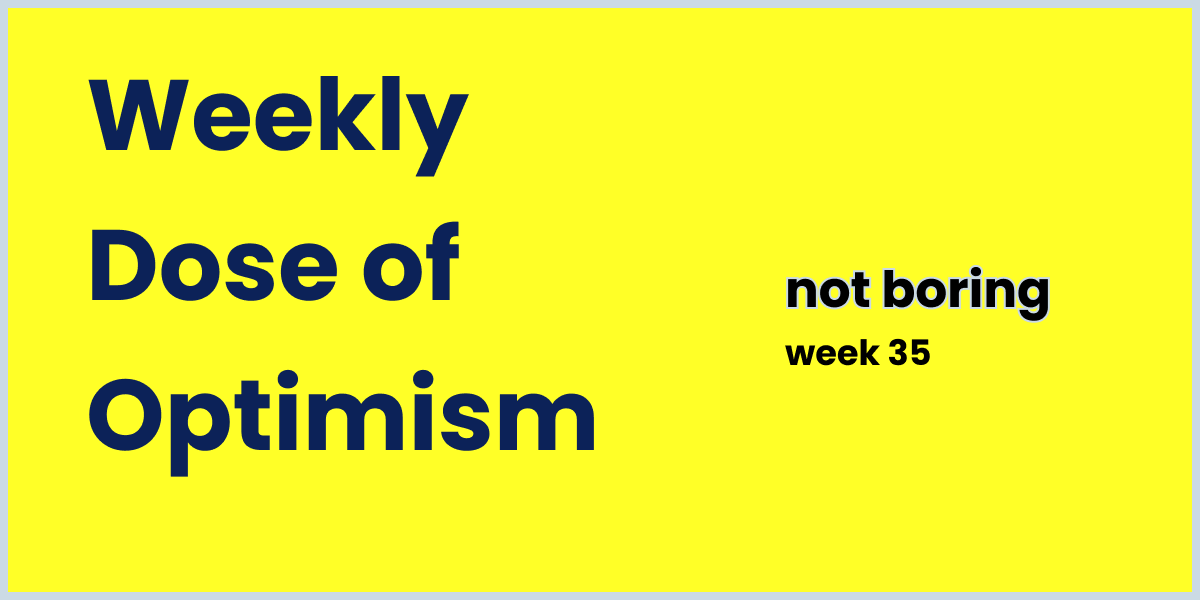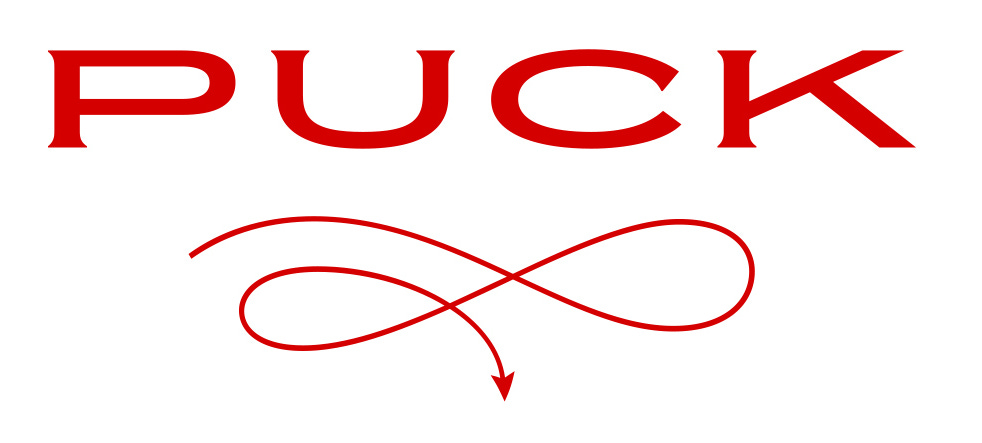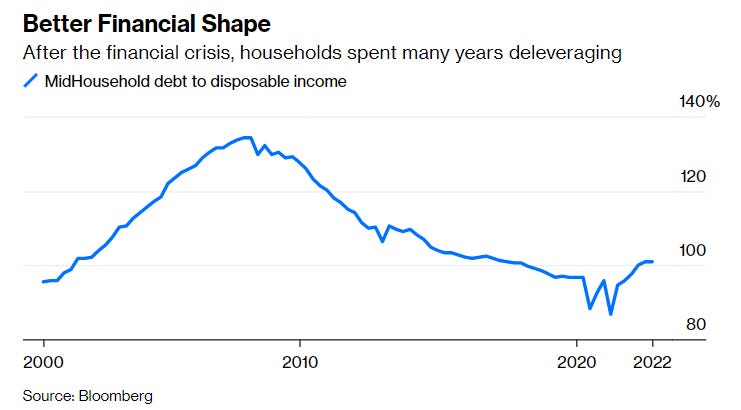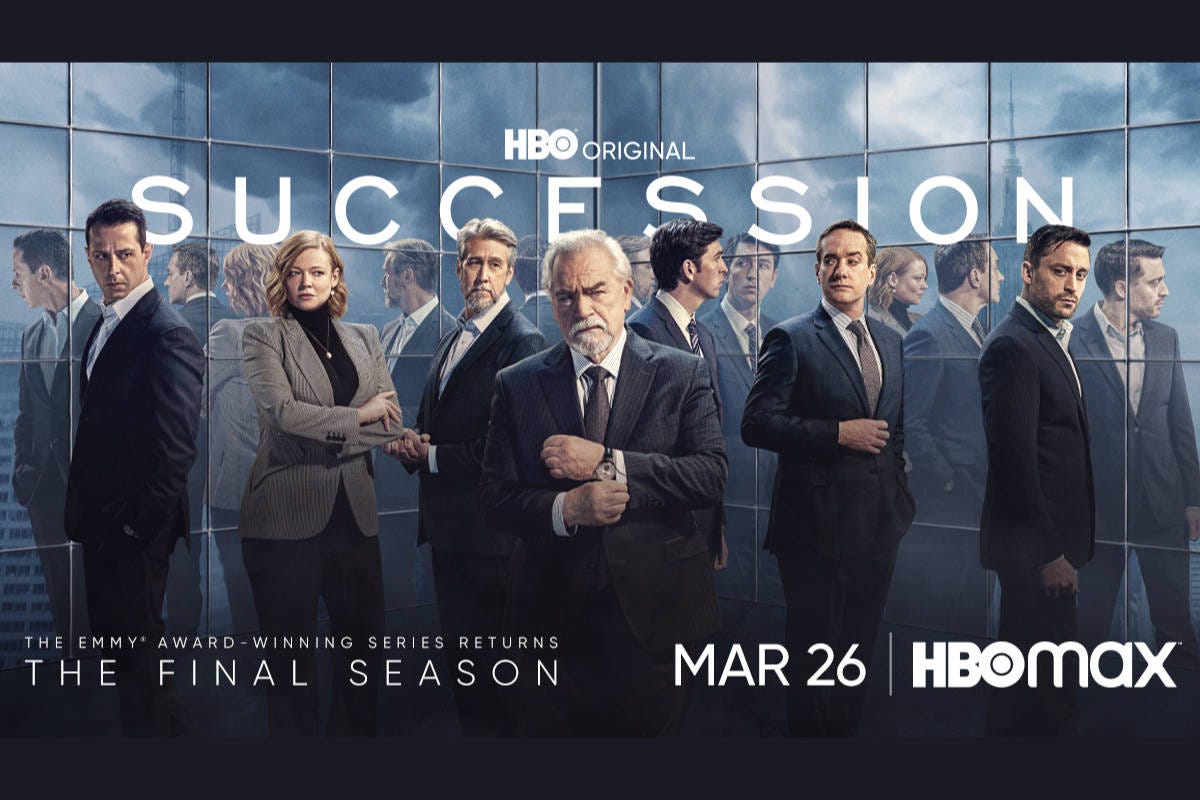Weekly Dose of Optimism #35
Deutsch, Plugins, AI Age, RSV Vaccine, Cowen on the Economy, Succession
Hi friends 👋,
Happy Friday and welcome back to our 35th Weekly Dose of Optimism. We had an intro here about how everything seemed to be stabilizing after a wild few weeks, and then lol. On Wednesday afternoon, the SEC hit Coinbase with a Wells Notice (Coinbase’s response here). Then less than 24 hours later, OpenAI took a flamethrower to huge swaths of the generative AI startup landscape with the release of Integrations. Can’t wait to find out what we have coming this afternoon!
Things are going to keep getting crazier on that winding slope upward.
Let’s get to it.
The Weekly Dose is brought to you by... PUCK
What do CEOs and the West Wing have in common? They all read Puck – including me! I don’t have many paid subscriptions, but Puck is one…and I 100% get my money’s worth.
Puck is a platform for smart, engaging journalism, covering the inside story within Wall Street, Washington, Silicon Valley, and Hollywood.
I'm a fan of all their journalists (from places like The Atlantic and Vanity Fair), but I’m addicted to Bill Cohan’s newsletter, Dry Powder. A former banker, Bill counts legends like Warren Buffett, Dan Loeb, and the SEC Chair Gary Gensler as readers. His latest edition detailed SVB’s desperate behind-the-scenes scramble to shore up financing before the bank imploded.
Check out all of their newsletters here. Plus, I've secured a personal discount for 21% off an annual plan for Not Boring readers.
P.S. Bill’s newsletter alone is worth the subscription cost…add in the eight other premier newsletters included and Puck is a no-brainer at $79/yr (with the Not Boring discount). Each of Puck’s writers could run paid Substacks charging 15x that price!
(1) David Deutsch and Naval Ravikant on The Tim Ferriss Show
We’re big David Deutsch fans here at Not Boring. You might know him from his Principle of Optimism — “All evils are caused by insufficient knowledge.” — which we cite every week or two. Maybe you’ve read his books, The Fabric of Reality and The Beginning of Infinity.
If you haven’t, or even if you have but need a little refresher, this conversation with even bigger Deutsch fan Naval Ravikant is a great place to start. Here’s what Naval had to say regarding Deutsch’s two books:
The last few years of my life, from a reading perspective, have been a rabbit hole exploration into these books and the ideas and thoughts that they have spawned. It’s a strong claim, but I can make it for myself. They’re the two most important books I’ve read.
This wide ranging conversation between Ferriss, Ravikant, and Deutsch covers:
Knowledge and understanding
How criticism and conjecture give us a basis for optimism
Artificial General Intelligence
Wealth and resources
They cover a lot of ground in under two hours, and if you have those hours to spare this weekend, it might just change your entire worldview.
(2) ChatGPT Plugins
Plugins are tools designed specifically for language models with safety as a core principle, and help ChatGPT access up-to-date information, run computations, or use third-party services.
Yesterday, OpenAI announced Plugins and people are losing their minds…for good reason. Plugins connect the power of OpenAI’s ChatGPT with the functionality and real-time nature of other websites. Take for example: cooking. Previously, you could ask ChatGPT to suggest a 3-course Mexican-themed meal and it would return a delicious sounding menu, along with an ingredients list, preparation instructions, and nutritional information. Now, with the Instacart Plugin…you can automatically order those ingredients and get same day delivery.
Taken a step further, plugging in a general purpose tool like Zapier opens up a pandora’s box of possibilities. LLM-powered automation workflows could actually be the thing that frees up billions of working hours each year.
Plugins are like an AI-native, more flexible version of Google Flights or Google Shopping. It allows the user to input a query, and not only get relevant information back, but also automatic next steps on how to action against that information.
Plugins are also another step for OpenAI in turning ChatGPT into a platform. It launched with a few select partners, but over time, you can imagine a whole ecosystem of developers and partners building useful plugins on top of ChatGPT. And because you can imagine that happening, it follows that it’s very hard to actually predict that type of things that will be built. That’s the beauty of a platform.
Speaking of the beauty of platforms, a guy who knows a thing or two about them recently shared a few thoughts on AI….
Bill Gates in GatesNotes
I’m lucky to have been involved with the PC revolution and the Internet revolution. I’m just as excited about this moment. This new technology can help people everywhere improve their lives. At the same time, the world needs to establish the rules of the road so that any downsides of artificial intelligence are far outweighed by its benefits, and so that everyone can enjoy those benefits no matter where they live or how much money they have. The Age of AI is filled with opportunities and responsibilities.
Just a few weeks ago, in Internet Computers, we surfaced a memo that Bill Gates wrote to Microsoft’s leadership team in 1995 on The Internet Tidal Wave. “In the next 20 years,” he wrote, “The improvement in computer power will be outpaced by the exponential improvements in communications networks… The Internet is the most important single development to come along since the IBM PC was introduced in 1981.”
He was right. And now, for the first time in 28 years, Gates is calling the next Tidal Wave. “I’m lucky to have been involved with the PC revolution and the Internet revolution. I’m just as excited about this moment.”
But in this moment, instead of running Microsoft and strategizing internally on how to use the internet to maximize Microsoft’s profits, Gates runs the Gates Foundation and is strategizing publically on how to use AI to solve the world’s biggest problems: saving the 5 million children under 5 years old who die each year, reducing inequity by improving education, fighting climate change, and more.
With the Gates Foundation’s resources and infrastructure, and these tools, we might start knocking down huge global challenges at nearly the rate OpenAI ships new products.
(4) F.D.A. Panel Recommends 2 R.S.V. Vaccines for Older Adults
Christina Jewett for The New York Times
The shots, if approved by the agency, would be the first vaccines publicly available against a respiratory virus that kills thousands a year. Some advisers did cite a small but identifiable health risk.
We’ve previously written about R.S.V., our own personal stories with the infection, and encouraging vaccine developments. Early this week, those developments took another step forward: an F.D.A. advisory panel recommended the approval of two different R.S.V. vaccines for adults 60 and older. While final approval is still in the hands of the F.D.A., the agency typically abides by the recommendations of advisory panels. The two approved vaccines were somewhere around ~80% effective in treating R.S.V. in older adults.
Infants, the other population group impacted by RSV, are still waiting for the approval of an RSV treatment tailored for them. Both AstraZeneca and Sanofi are seeking F.D.A. approval of a treatment aimed at protecting infants and toddlers up to 2 years old.
We like writing about the big breakthroughs, but the important thing is getting results, and this is a good step in that direction.
(5) This Banking Crisis Won’t Wreck the Economy
Tyler Cowen for Bloomberg
One reason for (relative) optimism is simply that the world, and policymakers, have been preparing for this scenario for some time. Not only do memories of 2008-2009 remain fresh, but we are coming out of a pandemic that in macroeconomic terms induced unprecedented policy reactions in most countries.
Over the past few weeks, the state of the banking system was at best uncertain and at worst, scary. Afterall, the last time there was a risk of a banking crisis…it actually happened, and it crushed the economy. It may seem like a distant memory for some, but it was only 15 years ago. For people over 30, the experience is still relatively fresh.
Tyler Cowen explains why this time is different and why there is reason to be optimistic that we’ll make it through this one relatively unscathed.
We actually learned from 2008. The regulations put in place post-GFC are meant to handle the exact type of problems we are facing today. These are understood challenges with direct solutions.
Household balance sheets are in a better place today than they were in 2008 to weather a downturn. Back in ‘08, everyone was levered to the gills, today less so. So if things turn bad, there is less risk that we slide into economy-wide declines in consumption.
According to Cowen, of course things aren’t great — but we could be in a much worse situation. He think’s we’ll get through this like we always have: patching up the present, at the expense of the future. This robbing Peter to pay Paul approach has been a profitable bet for the U.S. historically (largely due to innovation and a strong talent base) — here’s to hoping this time is no different.
Bonus: Succession
This is a public service announcement, the first episode of the last season of Succession airs this Sunday night at 9pm ET.
When we think and write about optimism here at Not Boring, that often means covering groundbreaking scientific research or explaining breakthrough technological developments or sharing a chart that shows how some terrible aspect of life has actually gotten much, much better over the last 50 years.
And sometimes, writing about optimism means recognizing and celebrating the great creative things that humans achieve that make life worth living. Succession is one of those great things. Most “serious TV people” would count it as one of the greatest television shows of all time — mixed in with The Sopranos, The Wire, Breaking Bad, and Game of Thrones.
According to ChatGPT, Succession masterfully weaves Shakespearean tones into its darkly comedic narrative, as a wealthy media family's power struggles and dysfunction create a modern-day tragedy teeming with ambition, loyalty, and betrayal. We just love cringing on the edge of our seats for an hour.
Over the last 5-10 years, we’ve been lucky enough to live through “The Golden Age of Television,” and Succession has been one of its stars. This final season is the end of an era, but if we had to guess, the beginning of an even more creative one.
Here’s a live look at me in my apartment on Sunday night:
Now, FUCK OFF!
Did you enjoy reading this Weekly Dose of Optimism?
(Powered by Sprig)
That’s all for this week. We’ll be back in your inbox on Monday.
Thanks for reading,
Dan







Re: banking crisis.
I actually agree there won't be a "real" banking crisis, but not for the nonsense reasons Cowen puts forward.
We won't have a "banking" crisis because there is ample historical evidence that the Fed will do anything to preserve the banks. Fed balance sheet expanded from ~$1T to over $8T in the GFC - in this context, the $650B in unrealized investment losses in the banking industry is piddling.
The "we won't call it a" bailout of uninsured depositors is also another piece of evidence. Regardless of the $25B TBTF facility amount - I would bet money that extra zeros can be added if needed.
So no worries on whether your $X in Y bank will be "safe" - you will get $X back.
You just won't be able to buy the same stuff as you used to... As Greenspan himself said: "We can guarantee cash benefits as far out and at whatever size you like ... but we cannot guarantee their purchasing power."
Me waiting for what kind of innovation AI will bring